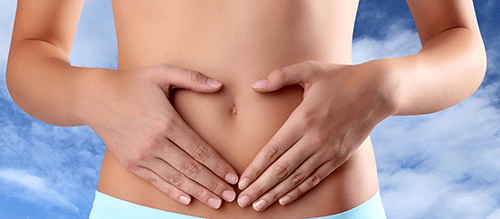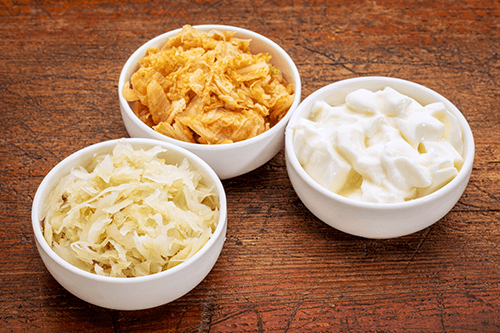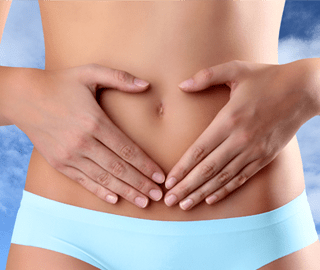Did you know that your digestive system makes up 70% of the body’s entire immune system? Your gut is actually known as the second brain and contains more neurotransmitters than the brain itself!
Brain fog, mood swings, headaches and poor memory could all be indicators of an unhappy gut and can make us more sensitive to hair loss. Visit Hair Loss Revolution for more information.
Because the gut plays such a huge role in a healthy body, it is important to not only restrict carbs while Banting, but to also restore the ecology of the digestive tract.
What is gut flora?

Gut flora or gut microbiota are the microorganisms living in the gastrointestinal tract that form an intricate system, which if out of balance, can have a detrimental impact on the body.
We have about 500 identified strains of bacteria in our digestive tracts, and more “bugs” than cells in our bodies – over 3 trillion in fact – which can weigh up to 2kgs! (Some might say that we are only 10 percent human as 90 percent of our cells are microbial.)
The ideal balance of beneficial to pathogenic bacteria in the gut is about 85 percent good to 15 percent bad bacteria. Maintaining this ratio is the secret to optimising gut health.
The good news is that you can cultivate new gut flora, in as little as 24 hours, by simply changing what you eat and following a LCHF diet.
Therefore, you are what your intestinal flora eat!
What happens when good bacteria go bad?
Each person’s collection of gut microbes is unique and sensitive to environmental conditions, which starts at birth.
As the baby passes through the birth canal, it will pick up the “fingerprint” of the mother’s gut flora, thus mom’s diet during pregnancy could affect the child for the rest of his or her life. In the case of a C-section, the baby’s gut flora, is virtually non-existent.
Compromised digestive health from such an early age, coupled with poor diet, stress, environmental pollutants, medications, antibiotics, and infections can swing the gut ratio the other way; where the bad bacteria far outweigh the good bacteria.
Carbs in excess are particularly destructive where gut flora are concerned. Restricting carbs without restoring the ecology of the digestive tract, with probiotic foods, doesn’t make sense as it could take many years to return the colon to health without them.
Good gut bacteria also synthesize vitamins B7 (biotin), B12, and K. The deficiency of these essential vitamins, along with a high carbohydrate diet, contributes to diabetes, obesity, hair loss, grey hair, eczema, anaemia, internal bleedings, ulcers, strokes, cancers, degenerative disorders such as Parkinson and Alzheimer disease, and common gastrointestinal, respiratory, and autoimmune disorders.
Digestive complaints such as gas, bloating, oesophageal reflux (also known as GERD or GORD), heartburn, a feeling of fullness for many hours, gallstones and irritable bowel syndrome (IBS) are some of the first disorders to resolve themselves when Banting.
How to restore digestive peace:
1. Remove all grains and sugar from your diet as bad bacteria feed on these and multiply quickly. By starving the body of grains and sugar, you will also be starving the bad bacteria
2. Repair the gut lining by following a Banting diet and incorporating foods known to heal thegut, such as bone broth which contains l-glutamine, a beneficial amino acid, and healthy fats found in butter, olive oil and oily fish. Coconut oil is known to have anti-bacterial properties, and zinc, (found predominantly in seafood and meat) helps to form digestive enzymes.
3. Eat probiotic-rich food to restore the good bacteria. These include: Greek yoghurt, kefir, kimchi, pickled foods, kombucha, and sauerkraut
4. Focus on prebiotics, which help to feed friendly bacteria and allow them to thrive in a healthy environment. Such as: asparagus, onion, garlic, leek, cabbage, green beans, artichoke, sweet potatoes, gem squash.
5. Eat foods rich in fibre that prevent constipation and aid overall gut health, such as avocados and spinach
Our top 5 foods/drinks for optimal gut health:

1. Fermented Foods: such as sauerkraut, pickled vegetables in brine, yoghurt, buttermilk, kefir and kombucha. Many years ago, before the invention of refrigeration and modern processed foods, our ancestors didn’t have the same problems with gut health as we do because their diets largely consisted of fermented and cultured foods, which provided the body with huge amounts of beneficial bacteria.
2. Bone broth: Helps to heal the gut, and promotes healthy digestion. The gelatine found in bone broth is a hydrophilic colloid. It attracts and holds liquids, including digestive juices, thereby supporting proper digestion.
3. Cinnamon: Improves digestion and balances blood sugar levels.
4. Mint: Soothes the stomach and relaxes the gastrointestinal tract.
5. Turmeric: Contains curcumin, which has anti-inflammatory properties, especially with regards to inflammatory bowel disease.
6. Green vegetables: such as broccoli, kale, cabbage, cauliflower, asparagus and green beans, which are all high in fibre and beneficial minerals.
For more information on gut health and recipes that promote a healthy digestive tract, take our Online Program


